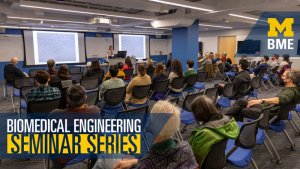Presented By: Biomedical Engineering
Biomedical Engineering Seminar Series
Understanding Broken Hearts: Modeling Multiscale Cardiac Mechanobiology with Alison Vander Roest, PhD

Abstract:
Heart disease is the leading cause of death in the developed world and is often characterized by changes in cellular scale mechanics that drive changes in heart structure and function. Hypertrophic cardiomyopathy is a specific genetic form of heart disease caused by mutations in the proteins responsible for muscle contraction (myosin), and study of these mutations have revealed surprising heterogeneity of effects that can complicate the development of therapies. The Vander Roest lab uses several innovative molecular, cellular, bioengineering, and computational modeling tools to examine and contextualize the role of altered cellular mechanics in driving changes in cardiac cell phenotypes. CRISPR/Cas9 gene editing in human induced pluripotent stem cells provides a model system to investigate the effects of specific mutations in a dynamic cellular context. Micropatterned engineered platforms will be used to improve myofibril alignment and allow direct measurement of intracellular force production by traction force microscopy. and the Vander Roest lab can study the impact of these mutations using stem cell derived cardiomyocytes. We use traction force microscopy and tension sensor FRET imaging to measure forces generated by these cells and relate these altered mechanics to disease phenotypes. We also use computational modeling to understand how altered forces are generated from myosin are propagated from the molecular to cellular to tissue scale. Understanding disease mechanisms and the heterogeneity of phenotypes across multiple scales (molecular, cellular, and clinical) will enable the development of better and more individualized therapies for patients with HCM.
Heart disease is the leading cause of death in the developed world and is often characterized by changes in cellular scale mechanics that drive changes in heart structure and function. Hypertrophic cardiomyopathy is a specific genetic form of heart disease caused by mutations in the proteins responsible for muscle contraction (myosin), and study of these mutations have revealed surprising heterogeneity of effects that can complicate the development of therapies. The Vander Roest lab uses several innovative molecular, cellular, bioengineering, and computational modeling tools to examine and contextualize the role of altered cellular mechanics in driving changes in cardiac cell phenotypes. CRISPR/Cas9 gene editing in human induced pluripotent stem cells provides a model system to investigate the effects of specific mutations in a dynamic cellular context. Micropatterned engineered platforms will be used to improve myofibril alignment and allow direct measurement of intracellular force production by traction force microscopy. and the Vander Roest lab can study the impact of these mutations using stem cell derived cardiomyocytes. We use traction force microscopy and tension sensor FRET imaging to measure forces generated by these cells and relate these altered mechanics to disease phenotypes. We also use computational modeling to understand how altered forces are generated from myosin are propagated from the molecular to cellular to tissue scale. Understanding disease mechanisms and the heterogeneity of phenotypes across multiple scales (molecular, cellular, and clinical) will enable the development of better and more individualized therapies for patients with HCM.